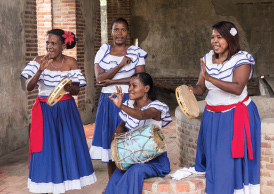
Cultural Heritage
The Dominican Republic has the privilege of including within its cultural heritages the first civil, military and religious building built by Europeans in the New World. The Colonial City of Santo Domingo, for example, was declared a Cultural World Heritage Site by UNESCO in 1990 and its considered a world center for Hispanic art.
 According to the Organization of American States, “the wealth and diversity of the Dominican Republic’s cultural heritage is the product of African, indigenous and European cultural interaction which took place in the national territory “.
According to the Organization of American States, “the wealth and diversity of the Dominican Republic’s cultural heritage is the product of African, indigenous and European cultural interaction which took place in the national territory “.
According to the Constitution of the Dominican Republic, all the artistic and historical richness, Will form part of the National Cultural Heritage and will be safeguarded by the State.
The nation’s cultural heritage is sub divided into: a) monumental heritage; b) artistic heritage; c) documental heritage and d) folkloric heritage.
Did you know? The Dominican Republic’s Chamber of Deputies created legislation for a project that declared bachata as Musical Cultural Heritage of the country. Bachata is considered a homegrown musical genre, enjoyed by all Dominicans, which is influenced by Dominicans’ experiences, feelings and everyday life.
Did you know? Within the Dominican Republic there is a National Office of Sub-Aquatic Cultural Heritage, responsible for preserving cultural heritage in territorial waters.
Did you know? The International Council of Museums (ICOM) published the red list of Dominican cultural sites in danger, with the purpose of helping art and heritage professionals and public order agents, to identify the Dominican sites and artifacts protected by national and international legislation. You can view the list here
Did you know? UNESCO also declared the Congos de Villa Mella as oral and intangible heritage of humanity.
Historical Moments of Dominican Folklore
1884 – For the first time Folklore was mentioned in the country, in a letter under the pseudonym “Valle de Gracia” published by the newspaper “El Eco del Pueblo” in the city of Santiago de los Caballeros.
1944 – Research is carried out about Dominican folklore music by noted musicologist Coppersmith. Additionally, Ralph Boggs offers a course about the topic of folklore at the Universidad Autónoma de Santo Domingo.
1946 – The Dominican Folkloric Society is founded and the Boletín del Folclore Dominicano is published for the first time.
1950 – The First Folkloric Festival “Recuerdos del Ayer” (memories from yesterday) is held in the Hotel Jaragua in Santo Domingo.
1955 – “Era de Trujillo” National Folkloric Congress is celebrated.
1963 – Professor Juan Bosch, President of the Dominican Republic, promotes folklore exchanges with specialists from Venezuela. The same year, Bosch celebrates the Centenary of the Dominican Restoration, with a great event that highlighted the participation of folkloric groups, marking an important moment for national popular culture.
1970 – The Folkloric Ballet from the Universidad Autónoma de Santo Domingo is founded.
1975 – The first edition of the Dominican Folklore Magazine is circulated. The first Provisional Folkloric Festival is celebrated in Puerto Plata.
1978 – The Dominican Folkloric Almanac is put into circulation.
1981 – The National Folkloric Ballet is created.
1988 – The Dominican Folkore Institute (INDEFOLK) is created at the Casa de Teatro.
2001 – Decree No. 173-01 designates February 10 as National Folklore Day in the Dominican Republic.
2003 – The Dominican Republic’s Folkloric Atlas is put into circulation.
2004 – The National Directorate of Folklore is created under the Ministry of Culture.
2006 – The book “Reseña Histórica del Folclore Dominicano” by Edna Garrido de Boggs is put into circulation.
2009 – The Ministry of Culture published the first “Biblio-hemerografía de la Cultura Tradicional y Popular de la República Dominicana”.
2016 – UNESCO declares merengue as heritage of humanity.
2018 – The OAS gave the Cultural Heritage of the Americas award to the Dominican Merengue
Links of interest | References:
Ministerio de Cultura de la República Dominicana www.cultura.gob.do
Organización de Estados Iberoamericanos (OEI) http://www.oei.es
Consejo Internacional de Museos (ICOM) http://icom.museum/L/1/
UNESCO www.unesco.org


